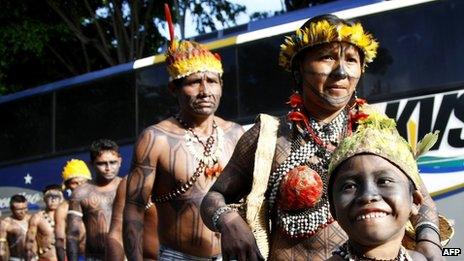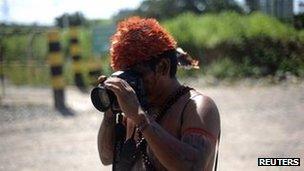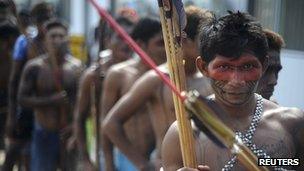Indigenous Brazilians use web to fight for rights
- Published

Virtual activism has convinced many Brazilians to support indigenous groups
When Terena tribesman Oziel Gabriel was shot dead in a clash with police forces in Sidrolandia, in the Brazilian state of Mato Grosso do Sul, last week, it only took minutes for videos and pictures to appear on Facebook accusing the Federal Police (PF) of responsibility.
Fellow members of his indigenous group who had witnessed the incident quickly passed on the images to a wide network of supporters.
It took only hours for the case to make headlines abroad. And, in an unusually swift reaction, Brazilian Justice Minister Jose Eduardo Cardozo promised a thorough investigation.
Brazilian indigenous groups say they are increasingly using social media websites to spread their views and to counter what they say are the prejudiced views about them in local media.
Luiz Henrique Eloy, a Terena lawyer, says newspapers and television stations in Mato Grosso do Sul often take sides in agrarian disputes, backing local farmers over indigenous groups.
Mission to educate
Mr Eloy says the media propagate the commonly-held view in the region that indigenous people are incited by non-governmental organisations and the government's Indian affairs office, Funai, to invade farmers' land.

Indigenous Brazilian are using the latest technology to their advantage
But according to Tonico Benites, an anthropology student of the Guarani-Kaiowa tribe, the reality is very different.
He says NGOs and Funai are often expelled from indigenous meetings for "trying to prevent action and discouraging land invasions".
"The initiative always comes from the people and their leaders. At the end of the day, it's them who will go to war, who will get the bullet," he told BBC Brasil.
Mr Benites and Mr Eloy are part of a growing group of highly educated indigenous leaders who have made it their mission to make the demands of their people heard.
Mr Eloy says there are 800 indigenous students currently pursuing undergraduate and postgraduate degrees in Mato Grosso do Sul.
At university, most of them have access to the internet and start using social networks to spread their message.
When they are back in their villages or in areas of conflict, they use mobile phones to post information on the internet in real time.
'Abandoned'
Mr Benites, who runs a page about the Guarani-Kaiowa on Facebook, says that virtual activism has convinced many Brazilians who were previously unaware of the situation to take a stand in their favour.

Indigenous groups say they have been abandoned by the Brazilian government
He says his group is fighting to have its ancestral land in the south and centre of the country recognised as indigenous territory.
But the process has been dragged out for decades by bureaucratic hurdles and legal challenges brought by the agricultural lobby.
The president of the National Confederation of Agriculture, Senator Katia Abreu, says indigenous groups "do not suffer from a shortage of land".
She says they have been given 12% of Brazilian territory when they make up only 1% of the population.
The National Confederation of Agriculture welcomed the government's announcement last month that it would change the way indigenous territories were allocated, giving the ministry of agriculture a bigger say in the process.
The change has triggered indigenous protests across the country, as groups fear the changes will place another hurdle in the way of reclaiming their ancestral lands.
They say they have been abandoned by the government and point to the fact that since taking office in 2011, President Dilma Rousseff has not once met indigenous leaders.